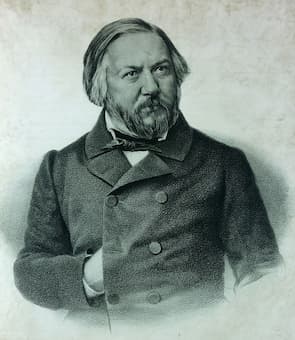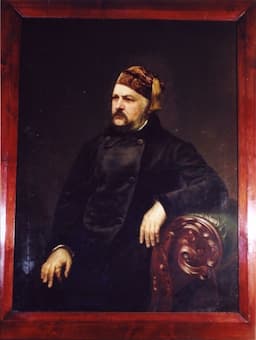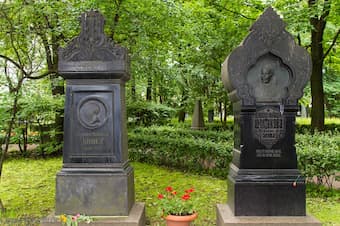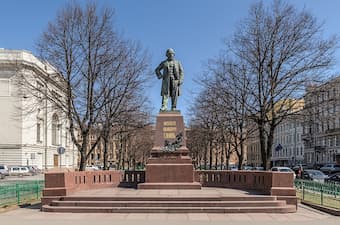
Mikhail Glinka, 1856
Mikhail Glinka (1804-1857) has been described as a “dilettante of genius.” His compositions are widely considered the foundation of Russian music, but he primarily wrote them while living and traveling in Western Europe for 23 years. During the 1850s, Glinka enjoyed much popularity in Paris, Berlin and other European capital. Glinka spent the last five months of 1856 in Berlin, enjoying the company of his old composition teacher, the distinguished Siegfried Dehn. In addition, he was looking forward to attend a gala concert featuring his music. Glinka excitedly wrote, “It is probable that I shall make a debut as a composer in Berlin. Everybody furthers the idea; Meyerbeer himself urges it. I wish to enter upon that new career with the Polonaise, which I composed for the coronation of their Imperial Majesties. You can imagine the circumstances; an excellent orchestra of eighty performers, twelve first violins, twelve seconds, ten violas, seven violoncellos, and as many double basses. Why should I decline to try my luck…”
Mikhail Glinka: A Life for the Tsar, “Polonaise” (Armenian Philharmonic Orchestra; Loris Tjeknavorian, cond.)

G. Goravsky: Mikhail Glinka, 1869
Glinka was ecstatic to be in Germany, as he records, “Germany is an excellent institution, good and conscientious. It suits me altogether. Therefore I can, if Allah permits, live here tranquilly. I have fallen into the hands of a miserable homeopath, who doses me with triumphant globules of belladonna. Naturally, I have left him and entrusted myself to a doctor… the sort I call cultured allopaths. The least medicine possible, and the greatest amount of exercise, that is the treatment that suits me.” Glinka had struggled with various health problems throughout his life. He reports “as a child, I was delicate, and subject to nervous and other disorders; my grandmother, an aged lady, was almost always unwell, and her room, in which I was confined, was kept at a temperature never lower than 25 Celsius.” Glinka grew up to become a hypochondriac, and he was alarmed by the smallest physical or psychological symptoms. In fact, the pages of his Memoirs are filled with lists and catalogues of doctors and medications, and by the age of 20, he was convinced that he was incurably sick.
Mikhail Glinka: Viola Sonata in D minor

Ilya Repin: Mikhail Glinka
On 27 January 1857, Glinka writes to his sister. “I hasten to tell you two bits of good news… The second piece of news is this, on 21 January the Trio in “Life for the Tsar” was sung at Court. Madame Wagner, who took the part of Petrova, is a capital artist much esteemed by the public. She was in good voice. Meyerbeer conducted. He is an excellent capellmeister from every point of view. To understand the importance of this event, you should know that it was a special concert—a grand gala. Nearly seven hundred persons attended, splendidly attired, and brilliant in gold and diamonds. As far as I know, I am the first Russian composer that ever received such an honour.” The concert was a resounding success, and Glinka invited performers, friends and guests to an all-night party. A contemporary observer wrote, “heated and excited, Glinka went out from the Palace into the cold air, and was truck in a moment by the hand of death. The poor composer had no resources of strength wherewith to fight the disease.”
Mikhail Glinka: Life for the Tsar, Trio Act I

Glinka’s grave at Tikhvin Cemetery
Glinka had always been susceptible to various bacterial and viral infections, and immediately after the concert, he developed a high fever. Bedridden, he was unable to take any nourishment and gradually wasted towards his death on 15 February 1857 at the age of fifty-three. The following day, his remains “were interred in the presence of the Russian Embassy, Meyerbeer, Beer, Dehn, Kachperoff, a Russian musician, Grünwald the violinist, the hotel-keeper, and two ladies, wives of Russian chaplains.” A few weeks later, Glinka’s body was taken to St. Petersburg and he was laid to rest in the Necropolis of the Masters of Arts at St. Aleksandr Nevsky Monastery. The Philharmonic Society organized a memorial concert on 8 March 1857 at the Noble Assembly, and an imposing bronze monument, with a base of red granite was erected in 1904.

Glinka’s monument
On that momentous occasion, Mily Balakirev’s “Cantata on the Inauguration of the Glinka Memorial” for chorus and orchestra was performed. After Glinka’s death the relative merits of his two operas became a source of heated debate in the musical press, as “they seem to point in opposite directions,” and Glinka’s heirs were forced to take sides. “Everyone agreed that Glinka placed the decisive boundary between the past and the future of Russian music, and it became impossible to accept the contradictions in his achievement.” In the end, the great debate as to what actually represented “real” Russian influences and what could be considered as part of an invented tradition became superfluous. Composers created their own hybrids, and Glinka could finally be proclaimed as the “Father of Russian Music.”
For more of the best in classical music, sign up to our E-Newsletter
Mikhail Glinka: Ruslan and Lyudmila, Overture and Dances from the opera (1842)
